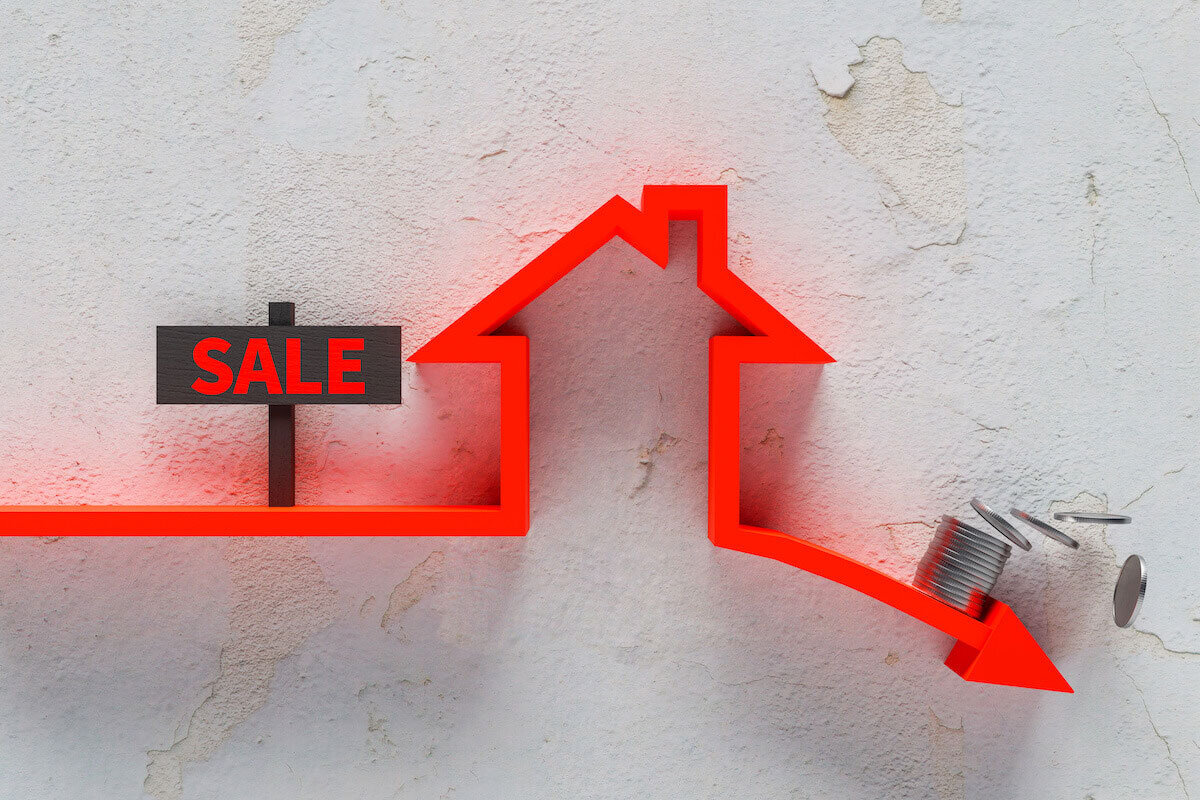 Are you considering selling your home below market value? If so, it’s important to understand the implications of such a move. You’ll need to know what a home’s value is, exactly, the top reasons someone might choose to sell their house for less than what it’s worth, and some legal issues you might run into. Is selling below market value right for you? Let’s find out.
Are you considering selling your home below market value? If so, it’s important to understand the implications of such a move. You’ll need to know what a home’s value is, exactly, the top reasons someone might choose to sell their house for less than what it’s worth, and some legal issues you might run into. Is selling below market value right for you? Let’s find out.
For informational purposes only. Always consult with a licensed real estate professional before proceeding with any real estate transaction.
Get a Cash Offer on Your Home With Cash Is King.
Want to skip the hassle of selling your home? We’ll make you a Guaranteed Cash offer. Get started now for free!
What is a Home’s Value?
When you’re selling a house for less than market value, which value are we talking about? When determining the value of a home, it’s important to understand the differences between appraised value, assessed value, and fair market value.
Appraised value is a professional estimate of what a property would be worth if it were purchased and sold in an arms-length transaction on the open market. Fair market value refers to what a buyer is willing to actually pay for a property at any given time. Assessed value is often used to calculate property taxes and is typically lower than its appraised or market value. All three values can differ greatly depending on the local housing market and other factors involved in buying or selling a home.
Appraised Value
The appraised value of your home is a strong indicator of its fair market worth. This figure is established by an expert appraiser who evaluates the property in person and considers its attributes, condition, and location when putting together an appraisal report. This serves as a valuable tool, but accuracy can vary depending on the appraiser’s familiarity with the area. The report forms the basis for establishing an appropriate listing price for your property. Ultimately, it’s important to remember that the reliability of this appraisal depends on the expertise of the appraiser and their knowledge of local real estate trends.
Market Value
While the appraised value is a professional opinion, you’ll never really know the exact market value of your home until you get an offer letter. That’s because the market value is determined entirely by the buyer, who may have different priorities than your appraiser.
Market value reflects what someone is willing to pay for a property, so you can usually get a close estimate by considering comparable sales of similar properties in the area. This is vital for pricing your home correctly and selling fast, which is why real estate agents will conduct a market analysis and find comps as part of their listing strategies.
Assessed Value
Assessed value is something you’ll usually only see on your property tax bill, and while it can correlate to your market value, it’s not the same thing. Assessed value typically falls below an appraised value, making it an unreliable measure of fair market worth. The local tax assessor determines this figure annually to calculate property taxes. Although it isn’t suitable for determining fair market value, it’s still a good idea to know your home’s assessed value, as you have the right to protest your property tax bill if the assessed value is incorrectly high.
Reasons to Sell a House Below the Market Value
There are several reasons why a homeowner might decide to sell their property below market value. In some cases, the house may be performing badly on the market due to its age, condition, or location, and discounting the price is a way to make the listing more attractive. Some individuals may also want to discount the price if they’re selling to a family member or friend. Additionally, you might need to sell the house on a strict timeline for any number of reasons, including financial issues such as bankruptcy or relocating for a job, and not have the time to wait for a full-price offer.
Your Home Isn’t Selling
There are several reasons why your home might be taking a long time to sell, including:
- Inaccurate pricing
- The state of the housing market in the area
- The home needs repairs
- Lackluster listing photos or curb appeal giving a poor impression
Before you decide to drop your asking price, try to determine the root cause of your home not receiving offers. If it’s something you can easily fix, you might still be able to sell for full home value. Keep in mind, though, that if your home has been stagnant on the market for some time, buyers will likely be suspicious of hidden flaws.
You Need to Sell Quickly
For those needing to quickly sell their home, setting a listing price below the prevailing market value can be an effective strategy. This approach can provide equity for various expenses or facilitate a relocation due to professional or personal needs. When getting money fast is more important than getting full value later—sometimes much later—underpricing can motivate buyers.
Be aware, though, that underpricing can give the impression that the home has flaws, such as needing repairs or maintenance. Some buyers will be wary of underpriced listings.
If the current market is hot, though, a low asking price can lead to multiple offers or even a bidding war. Your real estate agent can help you evaluate the risk versus reward of underpricing your home to generate competition.
Alternatively, selling to a cash buyer can get you a fair purchase price more or less instantly, and closing can happen in as little as two weeks. If you want to sell your home fast, take a look at how cash offers from investors work.
You’re Selling to Family or Friends
Considering selling your home to a family member or friend? It’s perfectly natural to want to give them a lower price. However, it’s important to take note of the legal ramifications of what’s called a “non-arms-length transaction.” A non-arms-length transaction refers to an agreement between two parties with a pre-existing relationship. The IRS may scrutinize such sales as they could potentially be used to protect assets from taxes.
To avoid any issues, the sale should resemble that of a typical home sale and comply with regulations; this includes filing a gift tax return if applicable. Failure to do so can lead to consequences for both buyer and seller, including potential tax penalties. Selling a house below market value to family members or friends can be done legally; just make sure you dot your “i”s and cross your “t”s.
Financial Issues
Facing foreclosure and bankruptcy is harrowing, and selling your home for less than its market price could be a way to get the funds you need. However, it’s important to weigh the pros and cons of opting for a short sale before committing to it. Selling below market value can provide immediate relief but might not cover your full outstanding mortgage balance. Thus, if you decide to pursue this course of action, make sure that the amount generated from the sale meets your needs without causing further financial difficulty.
What to Know About Selling Below Market Value
It goes without saying, but selling below the market value will mean that buyers will make lower offers. Additionally, underpricing to generate interest may backfire, as buyers may assume there is something wrong with the house if it is being sold for less than the market value. Tax laws should also always be taken into consideration. Selling below the market value can have many implications, so it’s important to understand them before making any decisions.
Possibility of Lower Offers
You may receive offers even lower than your listed price if you sell your house below market value. As such, FSBO sellers and real estate agents often include language in the listing explicitly stating that only offers at or above the listed price will be considered. This tactic can help to ensure that buyers do not try to negotiate for an even lower sale price than what is already being offered.
Additionally, declaring a strict lower limit encourages potential buyers to make their best offer sooner rather than later, before someone else swoops in with a better bid. Ultimately, making sure potential buyers are aware of your minimum requirements can help ensure you don’t end up settling for less than you want when selling below market value.
Buyers Might Make Assumptions
When considering marketing a property at a lower price, it’s important to be aware of potential ramifications. Buyers may make assumptions based on the listing price:
- They may suspect an undisclosed problem with the property.
- They could anticipate a challenging bidding environment and opt out of submitting offers.
- They may question the seller’s credibility in other aspects of the transaction.
- Their trust in the seller could erode if they perceive the tactic as manipulative or deceptive.
First impressions are vital to getting your asking price and more, and underpricing risks making a poor first impression. Ultimately, pricing below market value could have unintended consequences that you should take into consideration before proceeding with this strategy.
Be Aware of Tax Laws
It’s important to be mindful of tax laws when considering pricing a property. The IRS classifies any sale of a home below market value as a potential gift, which could mean the buyer is liable for paying a gift tax on the difference. Whenever there are uncertainties concerning taxes and deductions related to real estate transactions, it’s wise to consult with an experienced tax professional.
For informational purposes only. Always consult with a licensed real estate professional before proceeding with any real estate transaction.
Is Selling Below Market Value Right for You?
When deciding to sell a home below market value, it’s important to understand all the implications and consequences. It may be beneficial in some cases, but you must weigh all the pros and cons before making any decisions. Ultimately, knowing the value of your home, understanding why you are selling it below market value, and knowing what all your options are are key components that will help make this process smoother and more successful.
Get a Cash Offer On Your Home
No Commission. No Hassle. You pick the closing date.
CashIsKing.com works with cash investors on a daily basis and partners with investors who can deliver quick cash offers on properties of all conditions and locations. Why wait? Get a cash offer from an investor today!
Get a Cash Offer

